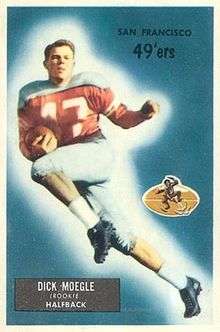Dicky Moegle
 Moegle on a 1955 Bowman football card | |||||
| No. 47 | |||||
|---|---|---|---|---|---|
| Position: |
Defensive back Halfback | ||||
| Personal information | |||||
| Date of birth: | September 14, 1934 | ||||
| Place of birth: | Taylor, Texas | ||||
| Height: | 6 ft 0 in (1.83 m) | ||||
| Weight: | 195 lb (88 kg) | ||||
| Career information | |||||
| High school: | Taylor (TX) | ||||
| College: | Rice | ||||
| NFL draft: | 1955 / Round: 1 / Pick: 10 | ||||
| Career history | |||||
| Career highlights and awards | |||||
| Career NFL statistics | |||||
| |||||
| Player stats at PFR | |||||
Richard Lee "Dickey" Maegle (born Moegle) (born September 14, 1934) is a former American football Halfback and defensive back. He played professionally in the National Football League (NFL) for seven seasons with the San Francisco 49ers, Pittsburgh Steelers, and Dallas Cowboys. He played college football at Rice University, where he was a consensus All-American in 1954.
Early years
Moegle attended Taylor High School, where he played football and basketball. He accepted a scholarship from Rice University and attended as a 16 year old freshman. His play was limited in his sophomore season (1952), after he was lost with a hand cut he suffered trying to open a classroom window that was stuck.[1]
In 1953, he teamed up with fullback Dave "Kosse" Johnson (the nation's second leading rusher), to win a share of the Southwest Conference title with the University of Texas, while registering 833 rushing yards with a 7.3-yard average (led the nation). In the 1954 Cotton Bowl Classic against Alabama, Moegle was involved in one of college football's most famous plays. With Rice leading 7–6, Maegle broke through on a sweep from Rice's five-yard line, and was running down the sideline in front of Alabama's bench on his way to a touchdown. Alabama's Tommy Lewis, without putting on his helmet, jumped off the bench and tackled Maegle. Seeing what happened, referee Cliff Shaw awarded a 95 yard touchdown on the play, and Rice went on to win the game 28–6.[2] Maegle finished with 265 rushing yards, which was a Cotton Bowl Classic record until the 2008 game when Missouri's Tony Temple rushed for 281 yards.[3] He finished with game records of 265 yards on 11 carries for an average of 24.1 yards per attempt and 3 touchdowns.[4] Moegele and Lewis were later invited to the Ed Sullivan Show to talk about the play.
As a senior he rushed 905 yards and led the nation in punt returns. He finished his college career after setting 26 school records, including career touchdowns (22), interceptions in a game (3) and total points in a season (72).
In 1979, he was inducted into the College Football Hall of Fame. In 1970, he was inducted into the Rice Athletic Hall of Fame. In 1980, he was inducted into the Texas Sports Hall of Fame
Professional career
San Francisco 49ers
Moegle was selected by the San Francisco 49ers in the first round (10th overall) of the 1955 NFL Draft. He entered the league as a 20-year-old rookie and was moved between the offense and the defense. In 1956, he became the starter at safety.[5]
On March 13, 1960, he was traded to the Pittsburgh Steelers in exchange for a first round draft choice (#6-Jimmy Johnson).[6]
Pittsburgh Steelers
In 1960, he was named the starter at safety. On December 22, he was traded to the Dallas Cowboys in exchange for offensive tackle Dick Klein and safety Bill Butler.[7]
Dallas Cowboys
After being acquired by the Dallas Cowboys in part for being a famous player in the state of Texas,[8] he was named the starter at safety in 1961. At the end of the season he had surgery on his right foot. On July 30, 1962, he was waived after re-injuring his foot in training camp.
Personal life
During his playing days, the running back's last name was spelled "Moegle", because it was constantly mispronounced, he changed his name to "Maegle" to be more phonetically correct in 1962.[9] He was a color announcer for the Houston Oilers and a manager of the Tidelands and Tides II hotels.
See also
References
- ↑ https://news.google.com/newspapers?nid=1891&dat=19931224&id=TL0fAAAAIBAJ&sjid=K9gEAAAAIBAJ&pg=6356,3238849&hl=es
- ↑ Heller, Dick (January 1, 2007). "Refs didn't Cotton to off-bench stop". Washington Times. Retrieved 2008-01-01.
- ↑ Heller, Dick (January 1, 2007). "Refs didn't Cotton to off-bench stop". Washington Times. Retrieved January 1, 2015.
- ↑ https://news.google.com/newspapers?nid=861&dat=19540103&id=VkFTAAAAIBAJ&sjid=RIUDAAAAIBAJ&pg=6616,79617&hl=es
- ↑ https://news.google.com/newspapers?nid=1368&dat=19610428&id=13NQAAAAIBAJ&sjid=9xAEAAAAIBAJ&pg=6911,3803871&hl=es
- ↑ https://news.google.com/newspapers?nid=1314&dat=19600314&id=WDNWAAAAIBAJ&sjid=wOcDAAAAIBAJ&pg=2224,4867520&hl=es
- ↑ https://news.google.com/newspapers?nid=1368&dat=19601222&id=NxEwAAAAIBAJ&sjid=2xAEAAAAIBAJ&pg=6726,1128031&hl=es
- ↑ https://news.google.com/newspapers?nid=2202&dat=19601222&id=D0gmAAAAIBAJ&sjid=2v4FAAAAIBAJ&pg=3898,704222&hl=es
- ↑ https://news.google.com/newspapers?nid=1499&dat=19620814&id=KDsaAAAAIBAJ&sjid=0CYEAAAAIBAJ&pg=7582,3044648&hl=es
| ||||||